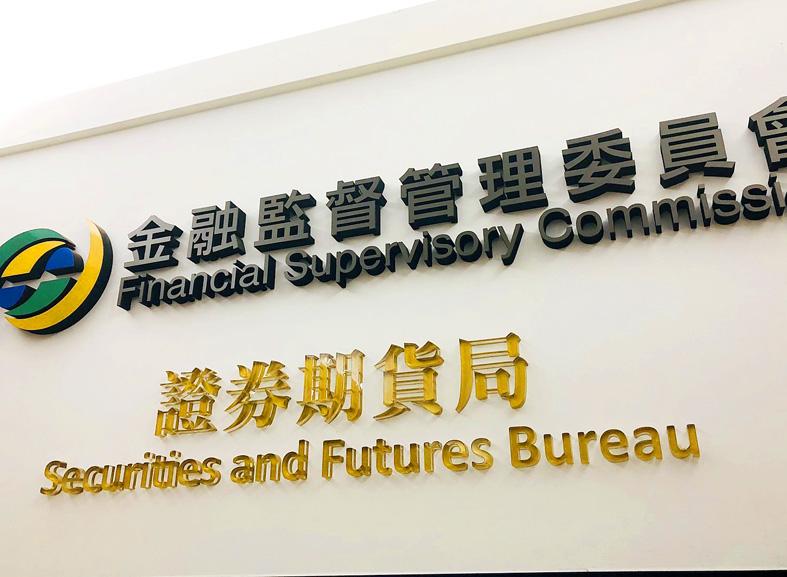The Financial Supervisory Commission (FSC) yesterday sanctioned 10 securities companies over failure to exercise proper information security controls regarding their high-speed trading services.
Cathay Securities Co (國泰證券), Concord Securities Co (康和證券) and SinoPac Securities Co (永豐金證券) received the severest fine of NT$1.44 million (US$50,945) each, as they had serious security breaches, Securities and Futures Bureau Deputy Director-General Kuo Chia-chun (郭佳君) told a news conference in New Taipei City.
The fines came after the commission conducted a special inspection of the Taiwan Stock Exchange’s information center in New Taipei City’s Banciao District (板橋) in November last year.

Photo: Kelson Wang, Taipei Times
Securities firms place their servers in the center to use the exchange’s Co-Location service, while the exchange’s matching engine and trading information systems are also housed there.
The inspection found that securities firms failed to apply best practices in how they set up their servers at the center, the commission said.
For example, Cathay Securities installed trading software developed by one of its clients on its server, with the software designed to automatically place orders for the client and enable the investor to trade ahead of competitors, Kuo said.
“The software was for the exclusive use of the client, not for all of Cathay Securities’ clients,” she said.
Concord Securities and SinoPac Securities were also found to have allowed external information technology vendors to monitor their servers via remote connections, and both firms failed to keep the records of their clients’ transactions, Kuo said.
Cathay, Concord and SinoPac, which in January had market shares of 2.92, 0.93 and 4.46 percent respectively, would be barred from setting up new units, conducting capital injections, issuing corporate bonds or issuing new exchange-traded securities for the next three months, she said.
MasterLink Securities Co (元富證券) was fined NT$720,000, as it failed to install a firewall and allowed external companies to manage its server via remote connections, Kuo said, adding that its fine was lower as the company had kept transaction records.
Fubon Securities Co (富邦證券) and JihSun Securities Co (日盛證券) were fined NT$240,000 apiece for failing to install a firewall, while Hua Nan Securities Co (華南永昌證券), Capital Securities Corp (群益金鼎證券), KGI Securities Ltd (凱基證券) and Yuanta Securities Co (元大證券) were ordered to improve a few problems, the commission added.

GROWING OWINGS: While Luxembourg and China swapped the top three spots, the US continued to be the largest exposure for Taiwan for the 41st consecutive quarter The US remained the largest debtor nation to Taiwan’s banking sector for the 41st consecutive quarter at the end of September, after local banks’ exposure to the US market rose more than 2 percent from three months earlier, the central bank said. Exposure to the US increased to US$198.896 billion, up US$4.026 billion, or 2.07 percent, from US$194.87 billion in the previous quarter, data released by the central bank showed on Friday. Of the increase, about US$1.4 billion came from banks’ investments in securitized products and interbank loans in the US, while another US$2.6 billion stemmed from trust assets, including mutual funds,

AI TALENT: No financial details were released about the deal, in which top Groq executives, including its CEO, would join Nvidia to help advance the technology Nvidia Corp has agreed to a licensing deal with artificial intelligence (AI) start-up Groq, furthering its investments in companies connected to the AI boom and gaining the right to add a new type of technology to its products. The world’s largest publicly traded company has paid for the right to use Groq’s technology and is to integrate its chip design into future products. Some of the start-up’s executives are leaving to join Nvidia to help with that effort, the companies said. Groq would continue as an independent company with a new chief executive, it said on Wednesday in a post on its Web

JOINT EFFORTS: MediaTek would partner with Denso to develop custom chips to support the car-part specialist company’s driver-assist systems in an expanding market MediaTek Inc (聯發科), the world’s largest mobile phone chip designer, yesterday said it is working closely with Japan’s Denso Corp to build a custom automotive system-on-chip (SoC) solution tailored for advanced driver-assistance systems and cockpit systems, adding another customer to its new application-specific IC (ASIC) business. This effort merges Denso’s automotive-grade safety expertise and deep vehicle integration with MediaTek’s technologies cultivated through the development of Media- Tek’s Dimensity AX, leveraging efficient, high-performance SoCs and artificial intelligence (AI) capabilities to offer a scalable, production-ready platform for next-generation driver assistance, the company said in a statement yesterday. “Through this collaboration, we are bringing two

Even as the US is embarked on a bitter rivalry with China over the deployment of artificial intelligence (AI), Chinese technology is quietly making inroads into the US market. Despite considerable geopolitical tensions, Chinese open-source AI models are winning over a growing number of programmers and companies in the US. These are different from the closed generative AI models that have become household names — ChatGPT-maker OpenAI or Google’s Gemini — whose inner workings are fiercely protected. In contrast, “open” models offered by many Chinese rivals, from Alibaba (阿里巴巴) to DeepSeek (深度求索), allow programmers to customize parts of the software to suit their